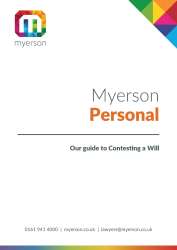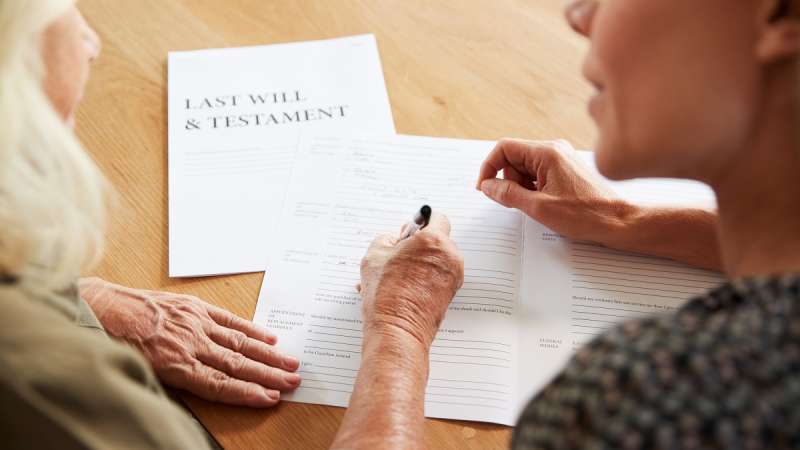Grounds For Contesting A Will
A will may be deemed invalid if:
- Lack of Testamentary Capacity: The deceased lacked mental capacity when making the will.
- Undue Influence: The will was made under undue influence or coercion.
- Improper Execution: The will was not properly executed, such as being incorrectly signed or witnessed.
- Fraud and Forgery: The will was forged or fraudulent.
You may also have a claim if:
- You were financially dependent on the deceased but were not adequately provided for in the will, and may be able to claim under the Inheritance (Provision for Family and Dependants) Act 1975.
- The deceased promised to leave you an inheritance, but this was not reflected in the will.
- A Statutory Will proposed for a mentally incapacitated person does not align with their true intentions, and you wish to challenge it through the Court of Protection.
Who Can Contest a Will?
You may be able to contest or dispute a will or bring a claim to challenge the terms in a will if you are:
Beneficiaries and Relatives
- A beneficiary under the will.
- A spouse, civil partner, partner, child, or grandchild.
Dependents and Promised Heirs
- An individual or organisation that was promised an inheritance.
- Other dependents of the deceased who were financially dependent upon the deceased.
Executors and Interested Parties
- An individual or organisation that has been disinherited.
- A third party affected by the present or previous will.
- An executor named in the will who believes the will is invalid or does not accurately reflect the deceased's intentions.
Our solicitors can advise you on whether you have grounds to contest the validity of the will itself. If the will is deemed invalid, the deceased’s estate assets will pass in accordance with a previous will or the rules of intestacy.
The intestacy calculator might help you understand how the intestacy rules apply to your situation.
We can also advise whether you can bring an inheritance claim under the Inheritance (Provision for Family and Dependants) Act 1975.
Inheritance (Provision for Family and Dependants) Act 1975 Claims
The 1975 Act allows certain categories of people to apply to the Court for financial provision from a deceased person’s estate, namely:
- A spouse or civil partner of the deceased (or former spouses or civil partners who have not remarried or entered into another civil partnership);
- An unmarried partner of the deceased who lived with them;
- A child of the deceased (including legally adopted children);
- A person who the deceased treated as a child; or
- A person who was financially dependent on the deceased.
You can apply whether the estate passes under a Will or the intestacy rules. You can apply even if you are already due to receive something from the estate if what you are due to receive does not amount to “reasonable financial provision” for you.
Whether you will succeed in your application depends largely on your financial position. Please contact us to discuss your circumstances.
We often settle claims for clients by mediation or other means of Alternative Dispute Resolution (“ADR”). This avoids taking the matter to Court and so helps to keep legal costs to a minimum.
It is important to act quickly. The general rule is that a claim must be brought within six months of the date of the Grant of Probate or Grant of Letters of Administration.
How To Contest a Will
Contesting a Will FAQs
Some common questions – please contact us to discuss your circumstances and seek legal advice.
Do Myerson Solicitors do no win no fee agreements?
In appropriate cases, the contesting a Will team at Myerson Solicitors will offer a no win no fee agreement to assist you in the funding of your claim.
We carry out a full assessment of your case and will discuss the no win no fee agreement with you in detail.
Am I entitled to my ex-husband's inheritance?
If you have divorced and entered into a clean break agreement which means he no longer financially supports you, then it is unlikely that you will have an entitlement to his estate. Divorce orders often make this clear and include clauses that such claims cannot be made.
If you have divorced but your ex-spouse continues to maintain you financially then you may have a claim against his estate, but each case would need to be considered individually.
Can my ex-husband claim my inheritance from my parents?
An ex should not normally be able to claim from your estate, but you should take advice about how to protect your estate in divorce proceedings particularly if you have children.
On divorce any gift or legacy to a spouse will fail and pass to others that may have been mentioned. It is important to update a Will on and after relationship breakdowns as this will only apply when a decree absolute is made and not before.
Can a mirror Will be contested?
A mirror Will can be contested in the same way as any Will, except a Mutual Will. The considerations that need to be considered are exactly the same, such as capacity, knowledge, in appropriate influence.
A mutual Will is very different to a mirror Will and specialist contentious probate advice should be obtained before considering challenges to these type of Wills.
Can I contest a Will if I'm not named in it?
If you are excluded from a Will and are related to the deceased you will have an “interest” in their estate, so you may be able to contest the Will.
In addition, you may have a claim under the Inheritance (Provision for Family and Dependants) Act 1975.
Does Myerson Solicitors deal with foreign estates?
Our contentious probate lawyers, at Myerson Solicitors, can only advise in relation to estates that are based in England and Wales.
Estates that are mixed and have assets in England and Wales and another country can be considered depending on their individual circumstances.
How can I stop a will going to probate?
You can stop a Will going to probate with a Caveat. A Caveat will ‘block’ probate applications if entered correctly. A Caveat may be removed if the Executor ‘warns’ the Caveat off, but steps can be taken to prevent this happening.
A Caveat can be entered on the Deceased’s estate with the Probate Registry. The Caveat lasts for 6 months and can then be extended for another 6 months, if required.
How long does contesting a Will take?
Some contesting a Will cases can be resolved quickly – between 1 to 6 months but others may take longer. The length of time it takes to contest a Will will depend on the type of claim that you might have and any time limits that might already exist.
Our contesting a Will lawyers seek to resolve most cases before court proceedings are needed, and we will always let you know of anticipated dates where and when we can.
How much could I get for a contesting a Will claim?
The amount that you may receive for contesting a Will will depend on factors such as the size of the deceased’s estate, as well as your personal circumstances.
Each contesting a Will case is different, but our contentious probate lawyers ensure that you are consulted and advised as to the settlements appropriate to your claim. In our experience most claims are capable of swift resolution and early payment.
Who can contest a Will?
You may be able to contest a Will or bring a claim if you:
- Were named as a beneficiary in a previous Will;
- Are the spouse/civil partner, former spouse/civil partner, cohabitee, child, stepchild or someone who was financially dependent on the person who has died;
- Were promised an inheritance; and/or
- Were named in a draft Will that was never signed.
Please note that this is not an all-inclusive list.
My relative is still alive but I do not think I will benefit from their Will. What can I do?
A Will has no effect until a person dies, meaning it is not possible to challenge a Will until that time.
If you are concerned about whether a Will is valid, it may be worth speaking to them to understand their decision and check whether they are happy with it. If they are not, they may wish to update their Will.
If they lack the capacity to do that (maybe because they have dementia), please contact us about the possibility of applying for a Statutory Will.
Can I bring a claim where someone died without a Will?
You may be able to bring a claim where someone died without a Will; please contact us to discuss your situation.
I have not seen a copy of the Will but I do not think I have been included. How can I get a copy?
Until a Will is processed by the probate registry, only the executors are legally entitled to see it. After it has been processed, it becomes a public document and should be available to download from the government website.
If the Will has not been sent to the probate registry, it might still be worth approaching the executors, or the solicitors who prepared the Will, in case they are willing to provide a copy in advance.
Can I contest a Will after the Grant of Probate has been issued?
You can contest a Will after the Grant of Probate has been issued, but we recommend taking action as quickly as possible.
How much does it cost to contest or defend a Will?
From the outset, our costs for disputing a Will or defending a Will dispute will be clear and transparent, and we can offer a range of funding options, depending on your circumstances including (where appropriate):
- “Contesting a Will - no win no fee” agreements
- Deferred fee payment
- Fixed fees
- Litigation loans
- Third-party funding
- Legal expenses insurance
- “After the event” insurance
What is the time limit to contest a Will?
The time limit to contest a Will depends on the type of the claim, but it can be as little as 6 months from the date of a Grant of Probate or Grant of Letters of Administration. We therefore recommend contacting our contentious probate lawyers as soon as possible.
What are the grounds for contesting a Will?
A Will can be contested on any of the following grounds:
- Lack of testamentary capacity (where the person who made the Will did not have the mental capacity to understand the decisions they were making)
- Undue influence (where the person making the Will was forced into making their Will in particular terms)
- Want of knowledge and approval (where the person making the Will did not know and approve its contents)
- Lack of due execution (where the strict legal requirements for signing a Will have not been complied with)
- Forgery (where perhaps one of the signatures on the Will is false of the Will itself is forged)
- Fraudulent calumny (where someone has told the person making a Will lies about another person and this has changed the contents of the Will)
Other related claims include those under the Inheritance (Provision for Family and Dependants) Act 1975 and proprietary estoppel claims.
Testimonials
Contentious Probate Case Studies
Case Study 1 - Neate v Heselden - Securing Will Validity
In the Neate v Heselden case, we represented Susan Pope, a friend and carer of the deceased, Raymond Watts, who had amended his will to leave her the bulk of his estate. Watts’s stepdaughter, Beverley Neate, challenged the will’s validity, alleging that he lacked full understanding and approval when making these changes due to alleged undue influence.
The case presented several complexities. Watts’s estate changes were significant, transferring primary inheritance from a family member to a non-relative, which can often lead to suspicion in probate cases. Proving Watts’s mental clarity and independence at the time of the will’s execution required careful evidence analysis, especially given the relationship dynamics with his stepdaughter.
Myerson’s contentious probate team, led by Senior Associate Eleanor Clarke, meticulously reviewed medical records, personal testimonies, and the timeline of the will’s changes. The team built a strong case for Pope, focusing on Watts’s clear testamentary intent and the nature of his estrangement from Neate, which added context to the will's contents.
The High Court upheld the will, dismissing Neate’s objections and affirming the validity of Watts’s final wishes. Pope retained her rightful inheritance under the will.
Reported on in The Telegraph, Mail Online, The Times, The Mirror and The Sun.
Case Study 2 - Syder v Saladino & Ors £45,000 Provision for Estranged Spouse in High Court Inheritance Case
Myerson Solicitors successfully represented Jacqueline Syder, securing a £45,000 award from her estranged husband’s estate.
Despite no provision in his will, the High Court ruled in Syder’s favour, given her financial contributions to their marital home and their legal marriage status at his death.
The case, handled by Myerson's Contentious Probate team, highlights key issues on financial claims in estranged spouse inheritance cases and the treatment of marital homes in probate claims.
Reflecting on the judgment, Jennifer McGuinness, Partner in our Contentious Probate Team, said:
"We are pleased to have secured a positive outcome for our client in what was a sensitive case. This judgment emphasises that the circumstances surrounding termination of marriage by death compared with a breakdown of relationship are "undeniably different". The position is often misunderstood. The approach to these sorts of cases is nuanced and fact sensitive. We hope this outcome brings Ms Syder some security and peace of mind; it has been a pleasure to work with her."
Ms Syder commented:
"During the process, I did at times find myself emotionally overwhelmed and stressed; however, the contentious probate team at Myerson went above and beyond to support me and guide me through the options, giving me time to evaluate my position. Collectively, they made me feel supported and confident in my claim."
Read more here.
Case Study 3 - Claim challenging the validity of a Will
We successfully acted for Laura Smith in her claim challenging the validity of her late mum’s Will. Laura’s mum had left a “homemade Will” where she made her husband, Laura’s stepfather, the sole executor and beneficiary. Laura was not included, which was odd given that she had a close relationship with her mother.
Laura’s stepfather maintained that the Will was valid, but Laura was adamant that the Will was suspicious and very unlikely to have been prepared and witnessed properly. We contacted the witnesses and obtained evidence supporting Laura’s claim to overturn the Will. The witnesses clearly were not present with Laura’s mum when she signed her Will. The requirement of the Wills Act 1837 specifically requires the witnesses to be present at the same time and has other important requirements which need to be followed so that the Will is valid.
Laura’s case was heard at a 2-day trial on 10th and 11th March 2022 in Manchester Business & Property Court, with both witnesses giving evidence. Laura’s stepfather defended the claim himself and failed in his defence entirely. Laura’s case was successful, and an independent administrator is now dealing with the estate. Laura will receive an equal entitlement with her brother in due course under the intestacy rules, but had she not pursued this claim, she would have received nothing.
This is one of several cases in which we have acted which have been publicised. It is very rare for cases to reach trial, but it is clear that Laura’s determination, together with our expertise in this area, ensured a very successful outcome which validated her decision to engage us and pursue this matter to the end.
Case Study 4 - Claim under the Inheritance (Provision for Family and Dependants) Act 1975
We are acting for a mother who has brought a claim for and on behalf of her minor child under the Inheritance (Provision for Family and Dependants) Act 1975.
The deceased died, leaving a sizeable estate, but failed to make any provision for his minor child. His child was born following the ending of his relationship with the mother, and he actively chose not to be involved either emotionally, physically or financially in respect of the child's life. Financial payments were only made after the involvement of third-party authorities and were minimal and sporadic.
Due to the estrangement that arose between the deceased and the mother, she remained unaware of his sudden passing, and it was by chance that an enquiry established that the deceased had died, leaving a new partner and a sizeable estate. The executors of his estate had obtained a Grant of Probate, and by the time of our instruction, the estate administration was well advanced. The six month period in which to bring a claim under the Inheritance Act was fast approaching and required urgent and immediate legal help to not only investigate the deceased's estate but also to ensure that it was secure and the assets of the same were secured and not dissipated.
In accordance with the required protocols, we intimated our client's claim at the earliest possible opportunity and, following negotiation with the solicitors acting for the estate and its beneficiaries, were able to secure a substantial financial settlement for the child.
Settlements involving children who are under the age of 18 need to be approved by a Judge, and the terms of settlement that have been reached are being structured to be as tax advantageous to the parties involved as possible and capable of final approval by the Judge.
Case Study 5 - Invalid Will Claim
We are acting for the deceased’s mother in defending a claim by his partner, who seeks to uphold a Will she maintains he made in early 2020. Our client argues that the 2020 Will is invalid, that his son did not make it and that it and his signature to the same are a forgery.
The deceased died suddenly in early 2020 and left a Will purportedly leaving the entirety of his estate to his partner. The deceased did not make a previous Will and died without leaving a wife, civil partner, or children. It is in his partner’s interest to ensure this Will is admitted to probate. Otherwise, she would not benefit from his estate.
By contrast, our client maintains that this Will is a forgery, and through our assistance, an expert’s report has been obtained, which is highly critical of the existing Will and supports our client’s claim that not only is the Will invalid, but the signature of the deceased is not his.
We have enormous confidence in the outcome of our client’s defence and that she will successfully set aside the Will. Cases involving forgery/fraud are incredibly rare and unusual, but in circumstances where suspicion arises, and motive for dishonesty is a factor, the clear benefit of obtaining advice and assistance is crucial.
Case Study 6 - Contested Inheritance (Provision for Family and Dependants) Act 1975 claim
We acted in 2021 in a rare contested Inheritance (Provision for Family and Dependants) Act 1975 claim which reached trial. We offered a no-win no-fee agreement to enable our client, Barrie Higgins, to instruct us in relation to this matter.
Barrie was the stepson of the Deceased, who had died intestate in 2017. The effect was that the entire estate would pass to his distant cousins. It was Barrie’s case that this was entirely contrary to his stepfather’s wishes and that he had been assured on more than one occasion that the Deceased had made a Will in his favour. Despite a considerable investigation, no such Will was ever found.
Although not related by blood, they were extremely close, and Barrie’s stepfather was involved in Barrie’s upbringing from a young age. The closeness was demonstrated by the fact that Barrie changed his surname to the Deceased’s and received continuing financial support from him throughout his life.
Unfortunately, unlike many cases, Barrie’s case could not be settled without court proceedings being issued. The Judge heard his claim just over 12 months after the court issued his claim. As we were still in Covid-19 at the time, the trial was dealt with remotely over two days, with the Judge providing his written judgment at a later date.
Barrie’s claim was entirely successful, and he was awarded £55,000 and a costs order in his favour. Unusually, within the award was a contribution towards his success fee. Despite the loving and close relationship Barrie had with his stepfather, had he not pursued the claim to this extent, he would have received nothing. This was not in keeping with the Deceased’s values and the bond that they shared.
More information about this and the academic points can be found on the following link.
Why Work With Our Contentious Probate Team
- We have been ranked as a Top-tier law firm by the Legal 500 for the last seven years.
- We have been recognised by The Times and The Lawyer as a Top 200 UK law Firm.
- You will receive expert quality and cost-effective advice.
- Price transparency - we provide our clients with an estimate at the outset for any work with ongoing updates throughout the matter. When appropriate, we can advise and act for you on a no-win no-fee basis.
- The contentious probate team is overseen and led by experienced Partner, Helen Thompson, who is a member of STEP (the global professional association for practitioners who specialise in inheritance and succession planning) and has completed the Advanced Certificate in Trust Disputes.
- All our solicitors are either full members of ACTAPS (the Association of Contentious Trust and Probate Specialists) or are working towards this prestigious qualification.
- We have the largest team of contentious probate solicitors in the North West ensuring you will receive the very best legal advice and support.
- We use the latest technology to ensure that we are working efficiently and that geographical distance is no bar to us, from providing you excellent client service.
- Take a look at the Myerson Promise for further benefits of working with us here.
Meet Our Contentious Probate Solicitors
Home-grown or recruited from national, regional or City firms. Our contentious probate lawyers are experts in their fields and respected by their peers.
Contact Our Experts
You can contact our lawyers below if you have any more questions or want more information:










